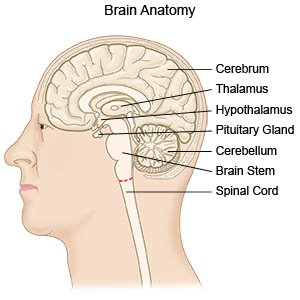Brain Tumors in Children
Medically reviewed by Drugs.com. Last updated on May 6, 2024.
A brain tumor is a mass that grows in your child's brain, or in an area near the brain. Examples include nerves in your child's skull, his or her pituitary gland, or the membranes that cover the brain. The tumor may start in your child's brain or travel to his or her brain from another body area. There are many kinds of brain tumors. Each kind is named for where it begins and what it does in the brain. A tumor may be malignant (cancer), or benign (not cancer). It may grow quickly or slowly.
 |
WHILE YOU ARE HERE:
Informed consent
is a legal document that explains the tests, treatments, or procedures that your child may need. Informed consent means you understand what will be done and can make decisions about what you want. You give your permission when you sign the consent form. You can have someone sign this form for you if you are not able to sign it. You have the right to understand your child's medical care in words you know. Before you sign the consent form, understand the risks and benefits of what will be done to your child. Make sure all of your questions are answered.
Medicines:
- Pain medicine may be given. Do not wait until your child's pain is severe before you ask for more medicine.
- Anticonvulsants may be given to prevent or control seizures.
- Steroids may be given to reduce swelling.
- Hormones may also be given if a part of the brain that produces hormones is affected.
- Anticoagulants may be given to prevent or treat a blood clot.
Tests:
- A neurologic exam can show healthcare providers how your child's brain is working. Other names for this test include neuro signs, neuro checks, or neuro status. Healthcare providers will check how your child's pupils react to light. They may check his or her memory and how easily he or she wakes up. Your child's hand grasp and balance may also be tested.
- X-ray, MRI, or CT pictures may show the size and location of any tumors. Your child may be given contrast liquid help to help the tumors show up better. Tell the healthcare provider if your child has ever had an allergic reaction to contrast liquid. Do not let your child enter the MRI room with any metal. Metal can cause serious injury. Tell the healthcare provider if your child has any metal in or on his or her body.
- A PET scan is used to take pictures of areas in your child's body. A small amount of radiation, called tracer, is put into your child's body before the PET scan. The tracer shows how chemicals, such as glucose (sugar), are working in his or her tissues. A PET scan may show a tumor or if a tumor has spread.
- A biopsy is a procedure used to take a sample of the tumor to be tested. Tests will show if the tumor is benign or malignant, and what kind of tumor it is.
- A lumbar puncture, or spinal tap, is a procedure used to take a sample of spinal cord fluid. The sample is tested for cancer cells in the fluid. This test will be used if other tests show it is a cancer that spreads through spinal fluid.
Treatment:
- Chemotherapy is medicine to help kill cancer cells. The medicine is usually given through an IV.
- Radiation is used to help treat brain tumors and to prevent new tumors from forming. Radiation is usually not given to children younger than 3 years. This is because radiation can damage a developing brain.
- Surgery may be used to remove the tumor. This is done if the tumor is in an area where surgery can be done safely. During surgery, such as craniotomy, healthcare providers will open your child's skull and remove the tumor. Surgery is used for both malignant and benign tumors. Any brain tumor can grow into another part of the brain and destroy healthy brain tissue. The goal of surgery is to remove as much of the tumor as possible.
- Radiosurgery targets cancer cells without harming healthy brain tissue. Your child may need radiosurgery if he or she has more than one tumor or cannot have open surgery, such as a craniotomy.
Treatment options
The following list of medications are related to or used in the treatment of this condition.
RISKS:
A brain tumor can grow into another part of the brain and destroy healthy brain tissue. The tumor will continue to grow and become life-threatening if it is not fully removed. A brain tumor also increases your child's risk for a blood clot.
CARE AGREEMENT:
You have the right to help plan your child's care. Learn about your child's health condition and how it may be treated. Discuss treatment options with your child's healthcare providers to decide what care you want for your child.© Copyright Merative 2024 Information is for End User's use only and may not be sold, redistributed or otherwise used for commercial purposes.
The above information is an educational aid only. It is not intended as medical advice for individual conditions or treatments. Talk to your doctor, nurse or pharmacist before following any medical regimen to see if it is safe and effective for you.
Learn more about Brain Tumors
Treatment options
Care guides
Symptoms and treatments
Further information
Always consult your healthcare provider to ensure the information displayed on this page applies to your personal circumstances.
